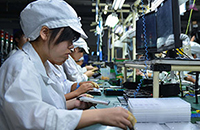Air pollution needs urgent action

This winter, the air quality over the north China plain has been record breaking - but not in a good way. From Jan 10 to16, the air quality in the Beijing-Tianjin-Hebei region was so bad it was actually off the scale used to monitor air quality. The air pollution reached levels that the World Health Organization describes as hazardous and people were advised to stay indoors. On Thursday, heavy haze and smog descended over most of northern and eastern China again.
It is reasonable to ask why the air pollution was so bad this winter. Weather conditions and topographic factors have been given as reasons, but, although contributing factors, these are not to blame. The worsening air pollution is linked to an energy mix that relies heavily on coal and to motor vehicle emissions.
But despite the astonishing growth of motor vehicles in our cities, it is the burning of coal that is the biggest cause of air pollution. More than half of the country's thermal power plants are located in the eastern region and China's coal consumption more than doubled between 2000 and 2011, from 1.5 billion tons in 2000 to 3.8 billion tons in 2011, accounting for almost half the world's total coal consumption. And with coal occupying nearly 70 percent of the country's primary energy consumption, it has become critical to reduce the use of coal if we are to solve the nation's overall air pollution problem.
In the face of the toxic air recently, one netizen said, "we have nothing but hot air to purify the skies". In fact, the government plans to have 350 billion yuan ($55.67 billion) investment in desulfurization and denitrification of coal-fired facilities and the phasing out of yellow-label cars - those that do not meet the Euro I emissions standard and so on- during the course of the 12th Five-Year Plan (2011-15) period.
However, it would be far more effective to reduce emissions at the source, which means the biggest challenge currently facing government departments is saying "no" to the country's air polluting culprits. The industrial sector was responsible for 68.5 percent of the nation's energy consumption in 2010.
Yet, according to the Joint Prevention and Control Plan on Air Pollution in Key Regions released recently by the State Council, China's cabinet, the amount of coal the nation consumes is set to rise by 30 percent during the period of the 12th Five-Year Plan. This is not going to let anyone breathe easier.
This highlights a key problem when it comes to environmental issues in this country - economic development takes precedence. The fundamental cause of the worsening air pollution is the mentality of economic growth at any cost, which has resulted in ever-worsening pollution and environmental degradation. In other words, even if unprecedented action is taken for treatment, there will be no cure as priority will still be given to newly launched projects.
And the priority given economic growth presents another problem, namely the failure of existing environmental protection policies and regulations to curb pollution. For instance, the current weak regulations covering emissions would suggest there has been a significant reduction in emissions when clearly this is not the case. Also those enterprises found breaking the regulations are still far lower than the cost of treating the pollution they produce. This means even if many large-scale enterprises with lagging production capacity fail to meet the requirements for environmental protection, the environmental protection department is incapable of shutting these enterprises down or forcing their relocation.
Dealing with air pollution requires taking action at the local level to reduce vehicle emissions and at the regional level to reduce industrial emissions. But it also requires giving more priority to environmental issues in policymaking. Our hope is that the environmental protection department will be truly capable of saying "no" to pollution, and it will raise standards and effectively enforce them, and that governments at all levels will prioritize quality of life not just economic growth.
The author is the campaigner for air pollution at Greenpeace.
(China Daily 03/01/2013 page9)





















